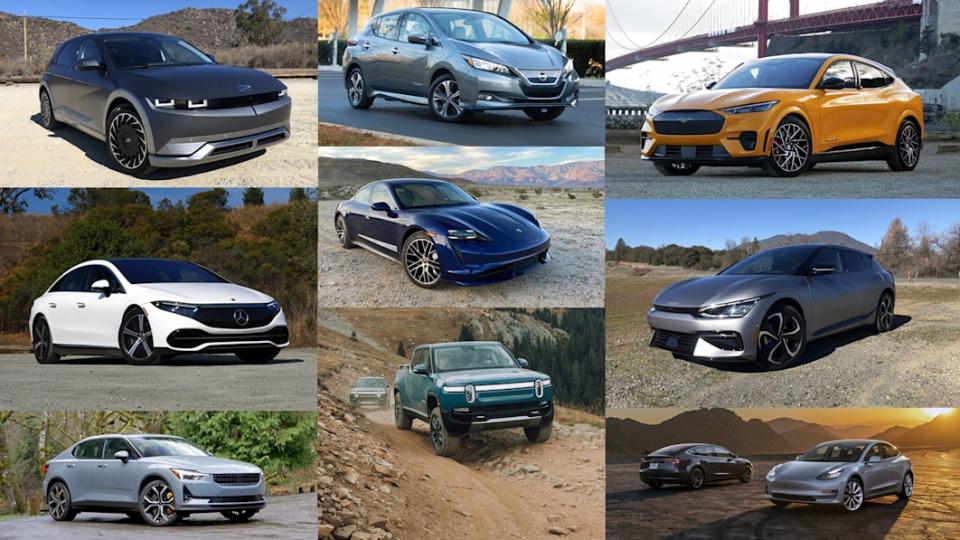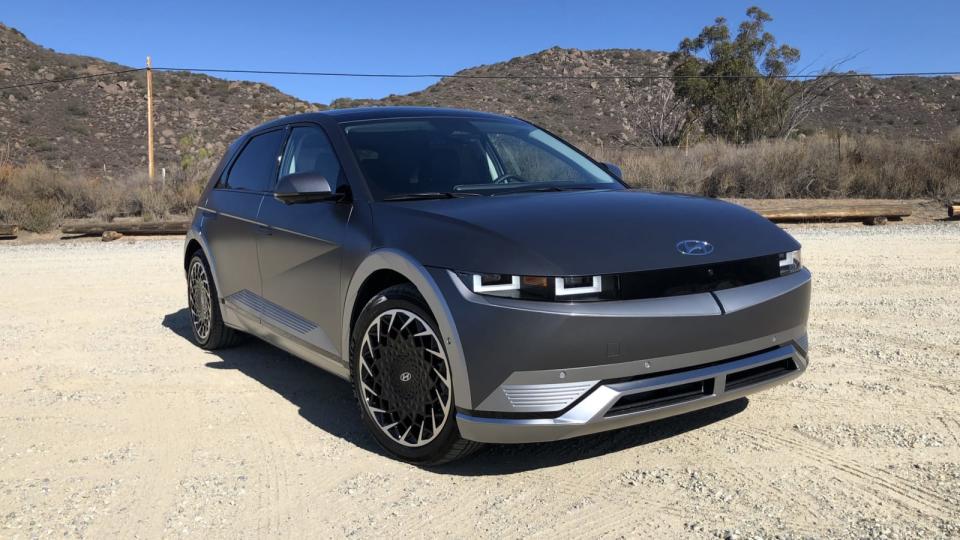Best Electric Cars and SUVs for 2023

Like our planet's endangered climate, this list is subject to change. There are so many electric cars, SUVs and even trucks on the horizon that it's only a matter of time before we get a chance to drive something great enough to be included on this list of best EVs (and to supplant one of the current choices). Again. We've already updated this list once.
We have broken our recommendations down alphabetically and within price segments, because obviously, as great as a Porsche Taycan, Mercedes EQS, Hummer EV and Rivian R1T are, only a tiny fraction of car buyers can afford them. Thankfully, many of the new and/or upcoming EVs are of the more affordable(ish) variety, including the Hyundai Ioniq 5 and Kia EV6 that we've had the chance to drive, plus the future vehicles like the Chevrolet Equinox EV. We look forward to testing them all as soon as possible — not to mention more expensive upcoming offerings like the Cadillac Celestiq, Mercedes-AMG EQE SUV and Chevrolet Silverado EV.
For now, though, these are the electric cars and SUVs that earn our top recommendation based on our testing:
Best EVs Under $35,000 | Best EVs Under $50,000 | Best EVs Over $50,000
Note that all base prices include destination charges unless otherwise noted, but not tax incentives, fuel savings or other discounts some EV makers bake into advertised prices.
Best electric cars under $35,000
Chevrolet Bolt EV and Bolt EUV
Why it stands out: Two body styles to choose from; compelling to drive; roomy back seat in EUV
Could be better: Limited cargo space in both
Read our Chevy Bolt Review
We're grouping the revised Bolt EV and the new-for-2022 Bolt EUV together here because, just in case the pictures above aren't illustrative enough, they're basically the same car. The EUV has considerably more backseat space, a vaguely more SUV-ish shape, subtle styling differences and eight fewer miles of range. They're so close together, including in price ($31,995 vs $33,995), we wonder why Chevy bothered revising and keeping around the Bolt EV at all. Either way, and most important, both are excellent electric cars made even better thanks to their shared interior, comfort and feature content upgrades (including the availability of Super Cruise for the EUV). They have ample ranges of 258 and 250 miles, respectively, to easily assuage range-anxiety fears, and the addition of a dual-level charge cord means you can easily charge at home without the need of a dedicated 240-volt charge unit (GM will even cover the costs of installing a simple 240-volt outlet in your garage). From a car perspective, they're roomy, well-equipped, quick to accelerate and handle better than our other two affordable EV choices. Importantly, GM has finally put them back on sale after a lengthy stop-sale caused by a need to replace recalled battery packs. That recall would not stop us from buying one.
Electric range: 258 miles (EV) or 250 miles (EUV)
Base price: $27,590 (EV) and $29,190 (EUV)

Hyundai Kona Electric
Why it stands out: Attractive price with tax rebate; fun to drive; easy-to-use tech
Could be better: Small back seat; limited cargo space
Read our full Hyundai Kona Review
Although it just barely gets under our $35,000 threshold, among the cheapest electric cars, the Kona Electric is the one the tries a little harder on the style front and makes sure you're having a decently fun time behind the wheel. Sure, it still looks a little weird (kinda like when Neo has his mouth removed in "The Matrix"), but when you're competing with a Nissan Leaf, the bar is set at an easily cleared height. Like the Chevrolet Bolt EV (which we'd love to include on this list, but its ongoing battery recall prevents its sale), the Kona Electric has a range of 258 miles, which is better than many of the priciest (though bigger and more powerful) offerings listed below. Unlike the Bolt EV, it's eligible for the federal tax credit, so it's effectively cheaper than its price tag would indicate. We really like the regular Kona, so choosing the Electric would similarly elicit our thumbs up.
Electric range: 258 miles
Base price: $35,345

Nissan Leaf
Why it stands out: Well-executed driver assistance features; low price with base battery; multiple range options
Could be better: Dull to drive; not as much range as other EVs
Read our full Nissan Leaf Review
The Nissan Leaf was really the first affordable electric car that didn't share its body with an internal combustion car. Now in its second generation, the Leaf is a little more normal in appearance, and thanks to the availability of the Leaf Plus model, can top the 200-mile plateau that seems to be the point where range anxiety begins to lessen. The base Leaf, however, is still around for those who don't intend to go very far at any given time and are happy to not pay extra for range they don't really need. Indeed, when you factor in the federal tax credit, the Leaf's base price is effectively only $20,875 and could be even cheaper if you live in California and other states with additional credits or tax rebates. Even the Plus is only in the mid-20s when rebates and credits are factored in thanks to a hefty price cut for 2022. With either version, you get Nissan's user-friendly infotainment tech and well-executed driver assistance features along with a reasonably spacious, comfortable and practical four-door hatchback body style, which is something that can't be said of other cheap EVs like the Mini Cooper SE and Mazda CX-30.
Electric range: 150 miles (base); 226 miles (Plus)
Base price: $28,375 (base); $33,375 (Plus)
Best electric cars under $50,000

Ford Mustang Mach-E
Why it stands out: Distinctive style; compelling performance; user-friendly tech; high-quality cabin
Could be better: Back seat is mounted a bit low; cabin design is a bit anonymous
Read our Ford Mustang Mach-E Review
One of the most talked about (and controversial) new cars is also one of the best electric cars you can buy. No, this is not "the new Mustang." It's a new thing, not a replacement, that effectively makes "Mustang" a Ford sub-brand by creating an electric crossover with styling cues and a performance-oriented driving character inspired by the still-very-much-on-sale Mustang coupe and convertible that are still powered by gasoline. That's a big part of the Mach-E's appeal: It looks cooler and drives better because it's a Mustang. Considering how uncool and drab lower-priced electric cars have been, this is very good news. Plus, its crossoverish body style provides usable backseat and cargo space, its giant Sync 4A touchscreen has impressed our editors with its clean simplicity, and its wide variety of drivetrain and battery combos makes Ford's first from-scratch electric car open to a wide range of needs and taste. Although there are now additional crossoverish EVs available for roughly the same price, the Mach-E remains firmly entrenched on this list of favorites.
Electric range: 211-300 miles depending on drivetrain (RWD vs AWD) and battery pack (68 vs 88 kWh)
Base price: $44,995

Hyundai Ioniq 5
Why it stands out: Airy and versatile cabin space; exceptional infotainment and safety tech; fun to drive
Could be better: Sci-fi hatchback styling won't be for everyone; initially available in few states; not as quick as Tesla Model 3
Read our Hyundai Ioniq 5 Review
We're not sure if the Ioniq 5 looks like it came from the future or from a "Back to the Future Part II"-style vision of the future, but either way, it sure is different. Although it looks like a compact hatchback, in reality, it's as long as the quite-large 2022 Hyundai Tucson with a wheelbase longer than the very-large Hyundai Palisade. It's not very tall or high off the ground, but inside, its deceptive dimensions provide a surprisingly airy, spacious and versatile cabin. We also love its user-friendly and well-executed technology, both in terms of infotainment and safety, plus the clean, minimalist look that still maintains some physical controls. Yes, that's a knock on Tesla. Every Ioniq 5 features the same 77.4-kilowatt-hour battery pack (though there will be a 58-kWh base pack eventually), and like other EVs, it feeds the rear wheels or all four thanks to an additional motor up front. This results in multiple performance and range figures, though the gap in performance is far more pronounced (7.3 seconds with RWD vs 5.1 with AWD). Importantly, every Ioniq 5 has 800-volt electrical architecture, making it possible to charge from 10-80% at a 350-kW charger in just 18 minutes. It'll speed things up at less powerful chargers as well.
Electric range: 303 miles (RWD) or 256 miles (AWD)
Base price: $44,875

Kia EV6
Why it stands out: Cool and well-made interior; exceptional infotainment and safety tech; fun to drive
Could be better: Some confusing interior controls; other EVs offer more complimentary charging
Read our Kia EV6 Review
Although based on the same platform as the Hyundai Ioniq 5, including its 800-volt electric architecture, the Kia EV6 is its own thing. You definitely can't tell they're mechanically related by looking at them inside and out. The EV6 is similarly shaped and sized as the Mustang Mach-E, itself an unusual "what is it exactly?" body style that's somewhere in between SUV, wagon and hatchback. The term "crossover" has never been so apt. Like the Mach-E, the EV6 skews toward the sporty end of the spectrum — especially the EV6 GT that boasts 576 horsepower and 0-60 time of 3.5 seconds. The Ioniq 5 doesn't offer such a high-performance model. The EV6 starts things off with a 58-kWh battery pack with a range of 232 miles and modest performance; the 77.4-kWh pack kicks it up to 310 miles with RWD and 274 miles with AWD. All of this basically means the EV6 is fully competitive on the EV front, but simply viewed as a car, we love its design, its well-executed tech, comfortable and engaging driving experience, and nicely crafted cabin that's also pretty cool to look at.

 Yahoo Autos
Yahoo Autos 
